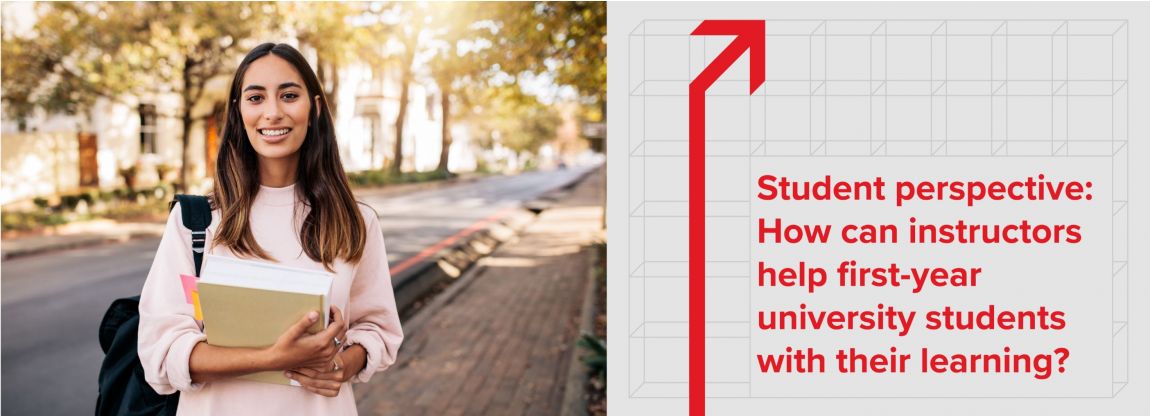How can instructors help first-year university students with their learning?
How can instructors help first-year university students with their learning?
Instructors play a critical role in the success of first-year university students. Many wonder how they can help new students with the transition to university study, especially where school teaching has been disrupted. While everyone is different with different needs, hearing from soon-to-be university students can provide useful insight. Read our interview with university applicant Ana to gain an understanding of students’ hopes, fears, and expectations before attending university, and how instructors can help.
Student engagement and adapting to higher education
"I am most looking forward to engaging in an academic environment that is different from what I am currently used to in secondary school”
For many students, part of the excitement of university is the change it presents from secondary school learning. “I am most looking forward to engaging in an academic environment that is different from what I am currently used to in secondary school,” said Ana, excited by the “change of scenery and pace” higher education will bring.
Key differences such as more independent study time, flexibility in modules and the ability to specialise in a particular subject are often appealing – Ana looks forward to a “more specialised method of learning” – but they also present a challenge to university newcomers.


For instance, many students will be new to the amount of independent learning that university courses require and might struggle to stay engaged with the content. “I tend to get a bit distracted when I have to work on an activity alone,” Ana tells us, “Or when a teacher lectures us for a long period. I found that I felt more engaged in class when I had to participate by speaking to the class or collaborating with my peers in an activity.” Participation and collaborative activity are sure-fire ways to boost student engagement at school, but how can instructors use these when it comes to pre-requisite work outside of class?
Ana expects this to be the biggest learning change for her. “In school currently, a large part of each class is collaborating with peers and consistently sharing thoughts and perspectives with others. In a larger classroom environment, such as in university, this may be different.” To best support first-year students, instructors need to be prepared to help bridge this gap in several ways. The right online learning environment can do a lot to support this, by creating a virtual learning community that engages students outside of classes. To find out more about this, along with some tried-and-tested techniques for improving student engagement, watch our webinar here.
Workload and student achievement
"I am a bit worried about starting over again at a new school, alongside learning how to deal with a heavy workload in all of my classes.”


Another challenge for new university students is balancing an increased workload alongside new independence. “I am a bit worried about starting over again at a new school, alongside learning how to deal with a heavy workload in all of my classes,” Ana told us.
This is a common worry for first years, so we asked Ana what she thought might help her to conquer a large amount of content.
“It would be useful to frequently assign smaller chunks or chapters of text as opposed to assigning an extensive amount of reading with a far-away due date. Reading the text in smaller sections makes it less overwhelming, and would personally motivate me to complete the tasks,” explains Ana. She also mentions summative assessments, saying “I prefer to have knowledge checks throughout the course, perhaps every other week. For me, it can be very stressful preparing for a large cumulative exam at the end of the course. As a student, I think it is best to have smaller check-ins throughout the course alongside final exams.”
Ana is not alone in this. Chapter assignments with real-time and continuous assessments have been proven to increase retention rates, boost grades and improve the overall learning experience for students. The use of a course overview and video content were also mentioned as effective tools: “It would be helpful to have an overview of the material that will be covered in a course in order to allow students to understand what the course consists of and to get ahead if they have time. The main study methods that work best for me are to revisit the notes I have taken in class and accompany it by watching YouTube videos about the topic.”
McGraw Hill’s own adaptive learning solution Connect allows instructors to automate all these elements and, for every unit that a student progresses through in Connect, their odds of passing their course increase by 31%. Find out more about how Connect can help students manage their workload.
University life
"I look for busier, sociable environments, and professors that are eager to support me and my learning.”
Finally, instructors can help first-year students to settle in by remaining approachable. When asked what advice she would give to instructors preparing to teach new students like her, Anna told us:
“I would suggest for instructors to form a formal yet friendly relationship with their students from the beginning, so that students do not hesitate to ask questions or for help outside of class. From my experience, the way that a teacher interacts with their students determines how likely a student is to engage in the class or whether or not they seek help when they are struggling.”


In fact, the support provided by instructors is often a key consideration for university applicants in the first place. “In terms of searching for a university and courses I am interested in, I look towards the atmosphere,” Ana said. “I prefer environments that are vibrant and welcoming, and schools that can give me opportunities such as internships to prepare me for the working world. I look for busier, sociable environments, and professors that are eager to support me and my learning.”
For further insights into first-year student experiences and concerns, why not read Catherine O’Connor’s advice to university newcomers.

